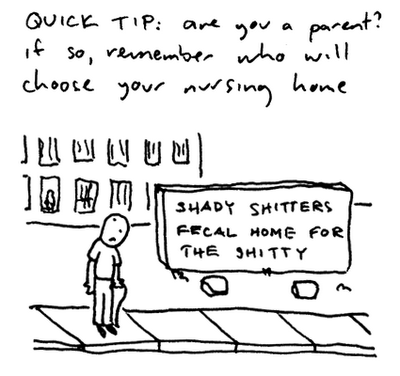
When Billy Broke His Head Â… And Other Tales of Wonder. -1994 - video recording
http://www.findarticles.com/p/articles/mi_m0842/is_n3_v20/ai_16025459 When Billy Golfus, an award-winning radio journalist was brain damaged as a result of a motor scooter accident 10 years ago, he became one of the 43 million Americans with disabilities--this country's largest and most invisible minority. He struggled with his own rehabilitation and came home from the hospital, only to discover that physical rehabilitation was only the first battle he'd have to fight. In America, disability is not just a medical fact, it is also a political reality. In this irreverent, first-person road movie, Golfus, a sort of underground Charles Kuralt, goes on the road to meet people with disabilities around the country and witness firsthand the strength and anger that is forging a new civil rights movement. This video blends humor with politics and individual experience with a chorus of voices to explore what it is really like to live with a disability in America--where pervasive discrimination and bureaucratic "helping" systems too often keep people with disabilities trapped in a labyrinth of government rules and legislated poverty. As Billy says, "This ain't exactly your inspirational cripple story." It's a documentary with an attitude, which should entertain, enlighten, and might even enrage it's viewers. cast for 'When Billy Broke His Head... And Other Tales of Wonder'
Billy Golfus - Host
production credits
Billy Golfus - Screenwriter, Producer, Cinematographer, Director
Slawomir Grunberg - Cinematographer
David E. Simpson - Producer, Cinematographer, Editor, Director
awards
Freedom of Expression Award (win) - - 1994 Sundance Film Festival
Freedom of Expression Award (win) - David E. Simpson - 1994 Sundance Film Festival
*******$*$*$*$*$*$*$*$*$*$*$*$*$*$*$*$*$*$*$*$*$*$*$*$*$*$********************
Okay, so if you haven't already realized, this post is about a film that was screened in our disability studies class.
The row of $$$ and *** is to mean that this is an extra special occasion and is worthy or our meritorious praise.
It is also a call to action and a call to arms, to change. Change the perceptions we hold about disabled people that invariably, but directly causes them so much harm.
In addition to the preamble review at the top of the post, I figured I would spend a minute sharing my own notes taken from the film.
Firstly; this film is from 1994 - but it has a freshness and vibrance that is unmatched in much of documentary film making. Hmm there must be something there, something of importance in relation to the Human spirit, the human condition, humanity...
This film is not the story of a disabled man
(with an impairment that is virtually invisible, meaning it is not readily apparent simply from looking at him, since he has brain damage)
in the sense that the usual story of disabled people is either THE TRAGIC BUT BRAVE VICTIM or the CUTE AND INSPIRATIONAL. Think - rick hansen,
to Harry Earles (the short guy below) in Tod Browning's ~ FREAKS
"Tod Browning dares to answer the question: Can a full grown woman truly love a MIDGET ?"
 So why this digression to media images, well, i guess it's because I am a firm believer in the church of the mass media, and I also belive that every mind numbing piece of mass media created has 'an' effect on the built and mental environments we traverse daily.
So why this digression to media images, well, i guess it's because I am a firm believer in the church of the mass media, and I also belive that every mind numbing piece of mass media created has 'an' effect on the built and mental environments we traverse daily.
Back to the film:
"as long as you don't have a job, they do." Spoken by a woman with a disability in relation to the 'Bureaucratick' folks in control of her life.
The overwhelming sentiment is anger, partly directed at the American Gov't - because as citizens of that country, they are denied services that would enable them to be self sufficient
- in effect - when a person asks for assistance - first they are seen as a person who is asking for preferential treatment - no person should be asking for more - they should be happy with that which has been given to them - right? - WRoNG
- The box doesn't allow everyone to fit inside in a nice and cozy way - Thus when a person asks - if they are not flat out denied - they often lose that which they had already been granted - i.e., if you were being given anallotmentt each month - and you felt that you could help to improve your personal situation by getting a job for x hours and x pay per week - the system of 'social assistance - would likely decide that you were no longer in need of any social assistance
- even if the pay you made from the job was not enough to cover your expenses - then the choice becomes - well - do i keep the job and live in a poverty worse than before or do i go back to the 'assistance' I was on? - Meaning that when the Gov thinks that your life in poverty is getting too cushy, they slap you with a 'spindown'
- what the fuzz is a spin down - how American is that - but it probably happens in Canada just as often - a spend-down is where you are slapped with hefty tax for brining in extra money - money that is seen as surplus and in addition to the X$s you have been allotted by the assistance' program.
The fact of the matter is that, people are faced with disincentives to work and improve their own personal situation, (this is where the whole - "they are last argument comes in") there is no middle road - no grey area for pencil pushers - for the pencil pusher has no 'real' authority - this action must be made in other ways -
For example: the disability rights movement in the US is largely spearheaded - or that's the way it is shown in the movie - to be a major player in disability rights activism - they are called
A.D.A.P.T. their current agenda = "There's no place like home; and we mean real homes, not nursing homes. We are fighting so people with disabilities can live in the community with real supports instead of being locked away in nursing homes and other institutions."
Their past agenda was all about transportation - The figures from the film went a little like this - Denver, CO - There was a larger push and large demonstration of civil disobedience by disabled people in Denver than there was in Chicago - The demonstration ended up shutting down an entire govt building for a day - in Chicago, no demonstration of like kind happened -
Today (1993) - ALL buses in Denver are accessible by wheelchair's - In Chicago - 600/3200 buses are wheelchair accessible -
The moral of the story was - the more civil disobedience the more results.
To return to the Current mandate of ADAPT - here are some #'s reflecting a familiar schema of power - money and greed -
The nursing home industry (yes industry, of warehousing people in places that may even 'look nice') is a 6 Billion$/year (1994) industry.
The gov of America chips in 3.8 Bil/year
- hell yeah lets take care of these people,Ii know, we'll stick in a place with lots of these 'useless' people and they can all sit there and watch the TV and be useless together - yeah George that sounds like a great idea - hell why don't we all move in there - uh - no - wait -I don't want to live in a nursing home - oh wait - how many people actually choose to go there - or want to - or are asked - is there a choice -???
It costs roughly $45,000/ year to have a person live in a NH? (Not sure where the funding is all coming from, or percentages)?
There are over 2 million Nursing homes in the US.
So lets compare - The cost it would be to allow someone to stay home, in their own environment - in their own surroundings - on their own schedules - with their own choices -- privacy - dignity - sanity - perhaps with assistance from care workers - hmm - safety - a home I'm comfortable in and feel safe in and get to live my life the way I want to live = priceless and a lot less than the cost of a NH.
Disabled people are the largest minority in the U.S.
The real problems are not the buses - the doors - the stairs - the high shelves - the visual culture - no - the problem is the attitudes - the prevailing attitude that sees disability as a worse fate than death.
To Read some of Billy Golfus' writings: go here...http://www.mouthmag.com/do_goodertrouble.htm
Sorry for the literary vomit - I am in the middle of a very busy time.
A
Thursday, November 8, 2007
When Billy broke his head and other thoughts
Posted by
andriko.l
at
3:02 PM
![]()
Subscribe to:
Post Comments (Atom)
Blog Archive
-
▼
2007
(55)
-
▼
November
(27)
- Thursday November 29, 2007
- Comment Paper - Yvette Cuthbertson
- Comment Paper- Week 1
- Aging with Disabilities
- Disability and youth
- Disability and Health Care Professionals
- Comment Paper
- Comment paper for Week 4: The Built Environment as...
- comment paper-week 3
- Comment Paper- Week 9
- Comment Paper posting
- More comments about "Rory O'Shea was here"
- Rory O'Shea was here
- Rory O'Shea Was Here
- Independent Living
- When Billy broke his head and other thoughts
- Not Believing
- Disability and conceptions of adulthood
- Comment Paper -- Disability and Conceptions of Adu...
- Disability, Bioethics and Human Rights
- Comment Paper #1 By CRYSTAL ANDERSON
- Comment Paper Week 8, Independent Living
- Comment paper #3
- Week 6 Readings Comment
- Disabled Youth
- Relationships
- Pic this
-
▼
November
(27)

3 comments:
watching the documentary "when billy broke his head", i am reminded of many of the structural barriers that people with disabilities also face in Canada. We praise canada for being on the forefront of taking care of our minorities, including disabled people. The only difference between us and the US is that we are very subtle about discriminating against disabled people, where as the US doesnt care about how they treat them. I am on disability and every time i walk into that place, i already know that there will have to be some fight. Recently, i had to go to Toronto for 7 days for surgery. they pay for food for my companion for all those days however, they do not give me any money for food because technically they give me food allowance money in my disability pension for the month. this is true, however, if i am at home it will cost me less because i have food in my fridge. buying restaurant food for one week would cost me my living allowance for the month!.. well i argued with the woman and she told me there was nothing i could do because it was government policy.. i had to bring my mother in to advocate for me, which made me feel like a child.. but it was the only way i could get anything done.. anyways the lady finally conceded in which she told us that she would get us a suite at the hotel where there was a fridge to buy food.. so instead of just giving my the 25 bucks a day for food, she cost taxpayers 150 bucks more for a suite!.. god, sorry for the rant.. just felt it fit in
oh and as i side note, also in canada, they have recently made changes to income supports in which before you were able to make 160 bucks a month at your job before they started taking money off your pensions.. they have recently changed it to any money you make, they take 50% of it off your cheque.. therefore, people who used to work only enough to max out that allowance so that they didnt have money taken off their cheque are now reluctant to work because there is no incentive to.
Comment by Kathryn B
Comment # 2 in response to ‘When Billy broke his head and other thoughts’
I would like to comment further on the topic of social assistance discussed in the writer’s commentary. It is very unfortunate but the major underlying philosophy under pinning the current social welfare system in Canada is the ‘law of lesser eligibility’, which states that we must pay people on assistance less the lowest paid worker, so as to encourage and motivate people to engage in productive labour. This law makes the assumption that a person’s inability to work lies within the individual; that the ‘non-productive citizen’ has some kind of character flaw such as laziness, greed, and therefore must be economically deprived as a disincentive to carry out such heaven practices. It is interesting to note that ‘the law of lesser eligibility’ was created as a social control tool in England at the beginning of the Industrial Revolution.
This ‘blame the victim’ ideology, does not take into consideration structural forces that impede peoples ability to enter the workforce such as the ablest work environment, gendered life course differences, and economic downsizing and globalization. Instead of creating a disincentive to work by clawing back child tax benefits, and other forms of assistance, we need to take a pro-active approach to welfare reform based on what an individual needs to achieve a healthy and equitable standard of living. This can be achieved by creating a ‘guaranteed minimum annual income policy’. For example, proponents of such a policy have calculated that the minimum equitable income for a single adult is currently set at 16,766 dollars a year-geared to inflation. Family size, geographic location, and assistive services would be factored in to the equation accordingly. It is interesting to note the current maximum social assistance allocated to a single disabled person is 11,759 dollars an annum, and the maximum social assistance allocated to a quote/unquote employable non-disabled person is set at a shockingly 6,822 dollar an annum.
Source: National Council of Welfare (2000). Welfare Incomes 1999.
Canadian Social Policy: An Introduction-Delany, Swift, & Graham
Comment by Kathryn B
Hey guys,
Do any of you know where to download this movie for free? I have to write a paper for my Accessibility Design class. Any suggestion would be appreciated. Thanks!
-David
Post a Comment